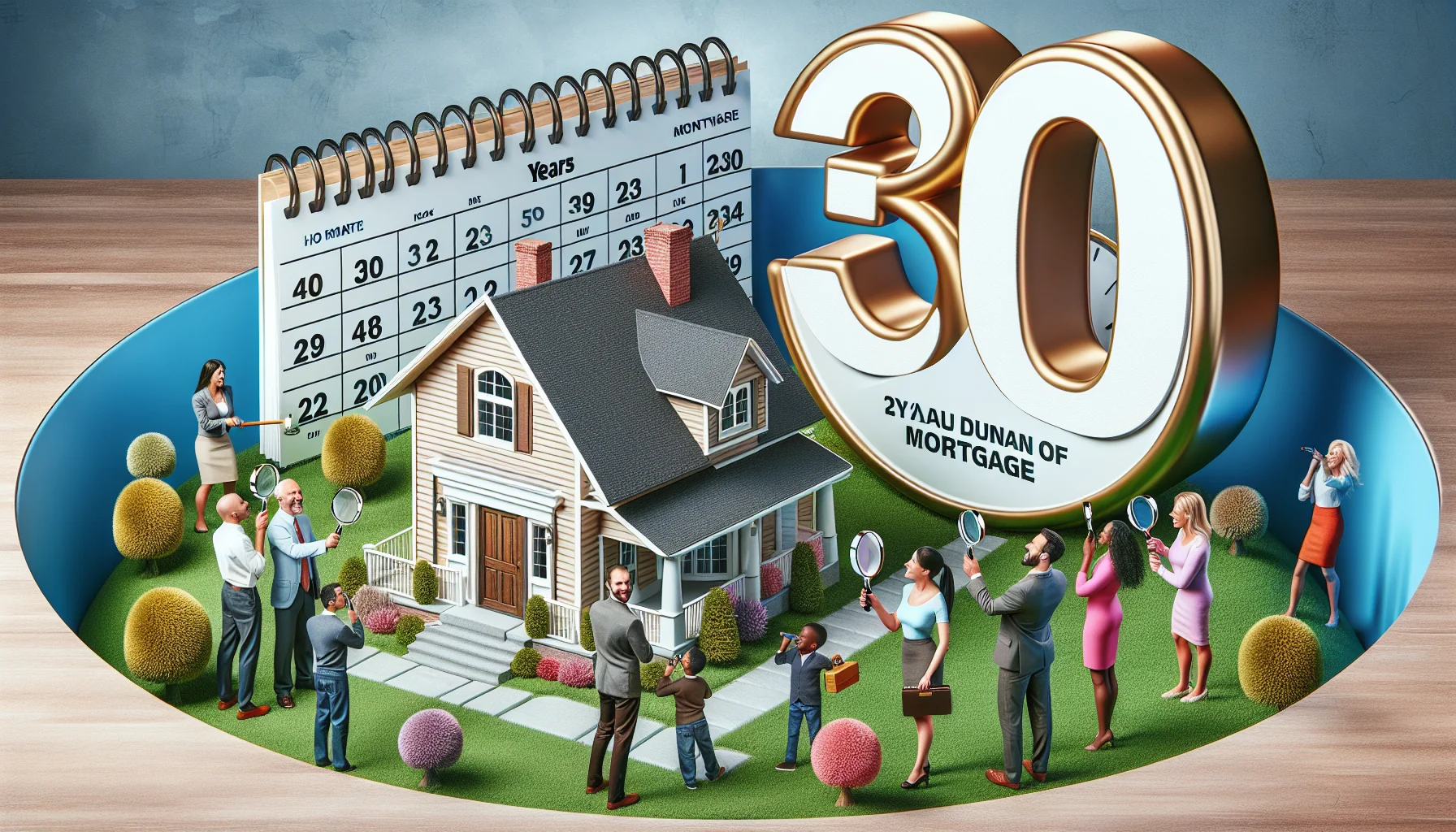A home mortgage is usually borrowed for how long Quiz
Test Your Knowledge
Question of
Understanding Home Mortgage Terms
Definition of a Home Mortgage
A home mortgage is nothing short of a stepping stone to achieving the dream of homeownership! It's a loan from a bank or financial institution that helps you purchase a house. With a mortgage, you're making a commitment to pay back the borrowed amount, plus interest, over a set period.
The beauty of a home mortgage lies in its ability to make real estate accessible. Without it, you'd have to save up for years to buy a home outright. Mortgages are secured loans, which means your new home acts as collateral. If payments are not made, there's a risk of foreclosure, so understanding the terms is crucial!
The Role of Principal and Interest
Every mortgage payment you make has two key components: the principal and the interest. The principal is the actual amount borrowed, while the interest is the cost you pay for borrowing that money. Initially, your payments are mostly interest; but over time, more of your payment goes towards reducing the principal.
This dynamic duo works together throughout your mortgage term. As you chip away at the principal with each payment, the interest recalculates on the reduced balance. This process ensures that over time, you own more of your home and owe less to the lender.
Fixed vs. Variable Interest Rates
Deciding between fixed and variable interest rates can feel like choosing between chocolate and vanilla both have their perks! Fixed rates stay constant throughout your loan term, offering stability and predictability in your budgeting. You can sleep soundly knowing exactly what your payments will be each month.
Variable rates, on the other hand, fluctuate with market conditions. They can offer lower initial rates compared to fixed ones but come with the risk of increasing over time. This choice requires an appetite for risk but can potentially save you money if rates decrease.
The Amortization Schedule Explained
An amortization schedule is like a financial roadmap for your mortgage journey. It outlines every payment from start to finish, showing how each one chips away at both principal and interest. Initially heavy on interest, this schedule shows how over time more of your money goes towards owning your home outright.
This schedule also offers valuable insights into how additional payments can affect your loan term and total interest paid. By understanding this document, you can strategize ways to pay off your mortgage faster and save money in the long run!
The Length of a Typical Mortgage
The standard mortgage duration in many countries spans 15 to 30 years it's a marathon, not a sprint! This lengthy term allows borrowers to manage sizable loan amounts with manageable monthly payments.
However, some opt for shorter terms such as 10 or 20 years. Shorter mortgages mean higher monthly payments but result in quicker equity build-up and less interest paid overall. It's all about finding that sweet spot between monthly affordability and long-term financial goals.
Common Mortgage Terms
- 15-Year Term: Higher payments but saves on interest and builds equity rapidly.
- 30-Year Term: Lower monthly payments but incurs more interest over time.
- Adjustable-Rate Mortgage (ARM): Starts with low rates that adjust over time according to market trends.
- FHA Loans: Government-backed loans with lower down payment requirements suitable for first-time buyers.
- Jumbo Loans: For properties that exceed conventional loan limits; typically require stronger credit scores and larger down payments.
Pros and Cons of Shorter vs. Longer Terms
Diving into shorter-term mortgages means higher monthly outlays but substantial savings on long-term interest costs. You're building equity at superhero speed zipping ahead in financial gains!
In contrast, longer-term mortgages ease the monthly strain on your wallet but play the long game when it comes to total interest paid. They're perfect for those who prefer smaller bites out of their budget each month while slowly but surely working towards full ownership.
How to Choose the Right Term for You
Selecting the right mortgage term is pivotal it shapes your financial landscape for years! Consider both immediate budget constraints and future financial goals. A shorter term could be ideal if you aim to pay off debt swiftly and can handle higher monthly payments.
If flexibility is what you're after or if other expenses loom large on your horizon, then locking in a longer term could be just what you need! This decision demands careful weighing of personal circumstances against financial aspirations don't rush it!
Factors Affecting Mortgage Duration
Credit Score Implications
Your credit score doesn't just affect whether you get approved; it also plays a starring role in determining your loan's terms! Stellar credit could unlock lower interest rates and more favorable conditions, potentially shortening your mortgage duration by reducing overall costs.
Maintaining good credit is like keeping fit it opens doors to better opportunities! Always aim to keep those scores high by paying debts on time and managing credit wisely.
Down Payment Considerations
A robust down payment doesn't just open doors; it propels you through them into better mortgage options! A larger down payment reduces your loan-to-value ratio leading to more favorable loan terms and possibly eliminating private mortgage insurance (PMI) costs!
Saving up for a significant down payment takes discipline but pays dividends in reduced loan amounts and possibly shorter mortgage durations talk about an investment in your future!
Impact of Interest Rates on Loan Term
Last but certainly not least: Interest rates are like the wind beneath your mortgage's wings they directly influence how quickly you'll soar towards full ownership! Lower rates mean lower costs overall and can result in shorter loan durations if coupled with higher payments.
Navigating these rates requires vigilance as they ebb and flow with economic tides. Locking in favorable rates at just the right moment could mean smoother sailing ahead on your journey toward homeownership!
Types of Home Mortgages
Conventional Mortgages
Conventional mortgages are the most common type of home loan, offering stability and competitive interest rates. They conform to the loan limits set by Fannie Mae and Freddie Mac, making them a popular choice for many borrowers. With a range of options including fixed-rate and adjustable-rate mortgages, conventional loans cater to a wide demographic.
Securing a conventional mortgage involves meeting certain eligibility criteria. Borrowers typically need a good credit score, a stable income, and a solid employment history. Lenders also look at the borrowers debt-to-income ratio to ensure they can manage their monthly payments alongside other financial obligations.
Eligibility Criteria for Borrowers
To qualify for a conventional mortgage, borrowers must demonstrate financial reliability. This means maintaining a credit score of at least 620 and having a debt-to-income ratio below 50%. Lenders will scrutinize credit history and scores more heavily for conventional loans than for some government-insured options.
Down Payment Requirements
The down payment is a crucial component of obtaining a conventional loan. Typically, lenders require at least a 5% down payment, but putting down 20% or more can eliminate the need for Private Mortgage Insurance (PMI), leading to significant savings over the life of the loan.
Private Mortgage Insurance (PMI) Explained
Private Mortgage Insurance is necessary for borrowers who put down less than 20% on their home purchase with a conventional loan. PMI protects lenders in case of default but adds an additional cost to the borrower's monthly payments. Once equity reaches 20%, borrowers can request to have PMI removed.
Government-Insured Loans
Government-insured loans provide opportunities for those who may not qualify for conventional loans. These include FHA, VA, and USDA loans which are backed by federal agencies. Each type addresses specific borrower needs and offers unique advantages such as lower down payments or no down payment requirements at all.
FHA Loans and Their Benefits
FHA loans are ideal for first-time homebuyers or those with less-than-perfect credit scores. They require as little as 3.5% down and are more forgiving when it comes to credit histories. By securing an FHA loan, borrowers enjoy lower closing costs and easier credit qualification guidelines.
VA Loans for Veterans and Service Members
Exclusively for veterans, active-duty service members, and eligible military spouses, VA loans offer tremendous benefits including no down payment or PMI requirements. These loans boast competitive interest rates and flexible credit guidelines, acknowledging the sacrifices made by military personnel.
USDA Loans for Rural Homebuyers
USDA loans target rural homebuyers and offer 100% financing with no down payment required. To qualify, buyers must meet income eligibility and purchase properties in designated rural areas. These loans encourage rural development by making homeownership more accessible in less-dense communities.
Non-Conforming Loans
Non-conforming loans don't fit within Fannie Maes or Freddie Macs criteria due to their size or borrower qualifications. These include jumbo loans, balloon mortgages, and interest-only mortgages - each tailored to specific situations that standard conforming loans cannot address.
Jumbo Loans for High-Cost Areas
Jumbo loans are designed for purchasing high-value properties that exceed conforming loan limits. They come with stricter credit requirements and typically necessitate larger down payments along with detailed documentation of assets to ensure borrowers can handle larger debt loads.
Balloon Mortgages and Their Risks
- Limited Amortization: Balloon mortgages often involve low monthly payments with a large lump-sum due at the end of the term which can be risky if refinancing is not an option.
- Refinancing Dependency: Borrowers may depend on refinancing to settle the final balloon payment but face challenges if market conditions change or their financial situation deteriorates.
- Rising Interest Rates: If interest rates increase significantly by the time the balloon payment is due, refinancing could become costly or unattainable.
- Economic Uncertainty: Economic downturns can affect property values negatively; if this happens before the balloon payment is due, borrowers may find themselves with insufficient equity to refinance.
Interest-Only Mortgages and Who They Benefit
An interest-only mortgage allows borrowers to pay only interest charges on their loan for a set period. This results in lower initial payments but does not reduce the principal balance during that time. Ideal candidates are those with significant cash flow who plan on selling or refinancing before principal payments commence.
The Home Buying Process
Pre-Approval for a Mortgage
Importance of Pre-Approval: Kick off your home buying journey with pre-approval for a mortgage! It's a game-changer, giving you a clear idea of your budget and showing sellers you mean business. It's like having a financial green light that says, "Yes, I can buy this!"
Documents Needed for Pre-Approval: Get ready to gather some paperwork! Lenders want to see your financial life on paper. You'll need tax returns, pay stubs, bank statements, and more. It's like putting together a financial resume time-consuming but totally worth it!
How Pre-Approval Affects Your Home Search: With pre-approval in hand, your home search shifts into high gear. You're now a VIP in the housing market, with realtors and sellers taking you seriously. It's like having a backstage pass to the homes of your dreams!
Finding the Right Property
Working with a Real Estate Agent: A great real estate agent is like a home-buying superhero! They understand the market, find hidden gems, and guide you through the maze of listings. They're your ally in the quest for the perfect home.
Attending Open Houses and Private Showings: Open houses and private showings are your chance to go behind the scenes. Inspect, imagine, and investigate every nook and cranny. It's like going on a treasure hunt in each potential home!
Evaluating the Location and Neighborhood: Remember, location is king! Check out schools, commute times, amenities these factors make or break your living experience. It's not just about the house; it's about the lifestyle it offers.
Making an Offer and Closing the Deal
Understanding the Offer Process: Making an offer is both thrilling and nerve-wracking! Its about strategy deciding how much to offer and what conditions to set. This step can be complex but nail it, and you're one giant leap closer to home ownership!
Negotiating Terms with Sellers:
- Stay Grounded: It's easy to get carried away in negotiations. Stick to your budget and priorities.
- Be Prepared to Compromise: Flexibility can lead to success. Find common ground where both parties feel satisfied.
- Determine Must-Haves vs. Nice-to-Haves: Clearly define what you cannot live without versus what you can negotiate on.
- Maintain Open Communication: Keep lines of dialogue open with sellers for smoother negotiations.
- Hire an Experienced Negotiator: A skilled real estate agent can be invaluable during this process.
- Avoid Low-Ball Offers: Insultingly low offers can sour negotiations; make reasonable proposals instead.
- Analyze the Market: Understanding current market conditions can give you an edge in negotiations.
- Prioritize Quick Closings or Flexibility: Sometimes offering a convenient closing timeline can be as attractive as a higher offer.
The Closing Process and Finalizing the Sale: The finish line is in sight! Closing involves heaps of paperwork but leads to that magical moment when keys change hands. Stay focused this final hurdle is what stands between you and your new home!
Mortgage Repayment Strategies
Paying Off Your Mortgage Early
Accelerating your mortgage repayment can save you thousands in interest and free up financial resources for other investments. By paying more than the minimum, you can significantly reduce the lifespan of your loan. This proactive approach to homeownership is not just a financial decision; it's a commitment to achieving financial freedom sooner.
Making extra payments on your principal is a powerhouse move. Each additional dollar goes directly towards reducing the loan balance, which in turn decreases the total interest paid over the life of the loan. It's like giving your future self a high-five; you're saving money and time simultaneously!
Biweekly payment plans are a clever hack for making one extra mortgage payment each year without breaking a sweat. By splitting your monthly payment in half and paying it every two weeks, you'll effortlessly make 26 half-paymentsthat's 13 full payments in a year instead of 12. This strategy is simple yet effective for chipping away at that loan balance faster than you can say "financial savvy."
Refinancing for better terms can be a game-changer in your mortgage repayment journey. Imagine locking in a lower interest ratesuddenly, your monthly payments are reduced, or maybe you've shortened your loan term. You're now on the fast track to bidding adieu to that mortgage, potentially saving an eye-watering amount in interest.
Dealing with Financial Hardship
Financial hardship doesn't have to mean defeat when it comes to your mortgage. Loan modification programs can be lifesavers, adjusting the terms of your loan to make repayments more manageable. It's about finding solutions, not surrendering to circumstances.
Forbearance and repayment plans offer breathing room when money is tight. Forbearance temporarily reduces or pauses your mortgage payments, while repayment plans help you catch up gradually once regular payments resume. These options are like financial lifeboats, keeping you afloat until you reach calmer waters.
Short sales and foreclosures are terms no homeowner wants to face, but understanding them is crucial. A short sale occurs when you sell your home for less than what you owe on your mortgagewith lender approvalwhile foreclosure is the legal process where a lender takes possession of your property due to nonpayment. Knowledge is power: knowing these options helps you navigate tough times with eyes wide open.
Planning for the Future
Building equity in your home isn't just about having a place to live; it's about creating financial stability for tomorrow. With every mortgage payment, you're buying more of your homeand less of that debtincreasing your personal wealth bit by bit. Equity is like a silent partner in your investment portfolio, quietly growing over time.
Leveraging your home as an asset can be incredibly strategic if done wisely. Your home isn't just where memories are madeit can also be the key to funding those dreams and plans that require capital. From starting a business to funding education, using home equity wisely can propel you towards those goals with confidence.
- Understand Your HELOC: Get clear on terms and rates before diving in.
- Borrow Wisely: Only take what you need and have a plan for repayment.
- Avoid Overleveraging: Keep debt at manageable levels compared to home value.
- Maintain Good Credit: A strong credit score ensures better HELOC conditions.
- Have an Exit Strategy: Know how you'll handle potential rate increases or financial shifts.
A Home Equity Line of Credit (HELOC) can be an excellent tool when used responsibly. It allows homeowners to borrow against their equity at favorable rates for various purposes such as renovations or consolidating debt. But rememberthis power comes with responsibility! Always have a solid plan for using and repaying funds accessed through a HELOC.
Interest Rates and Their Impact on Mortgages
How Interest Rates are Determined
The magic behind interest rates involves a mixture of policy, economic health, and market forces. It's crucial to understand these elements to anticipate changes in your mortgage payments.
The Federal Reserve's Role is pivotal in shaping interest rates. By adjusting the federal funds rate, the Fed influences borrowing costs across the board, impacting how much you'll pay on your mortgage.
Keenly observe Economic Indicators to Watch , such as GDP growth, unemployment rates, and inflation. These stats signal economic trends that can lead to rate adjustments.
The Bond Market's Influence cannot be overstated. Mortgage rates often shadow the yield on 10-year Treasury notes, so keeping an eye on bond trends is essential for predicting mortgage rate movements.
Fixed-Rate vs. Adjustable-Rate Mortgages (ARMs)
Benefits of Fixed-Rate Mortgages include predictable payments and insulation from interest rate swings. Locking in a rate safeguards your budget from future hikes.
Conversely, the Risks and Rewards of ARMs lie in their potential for lower initial rates. But beware; when rates climb, so do your payments.
To decide between fixed or adjustable rates, assess your long-term plans and risk tolerance. Will you sleep better knowing your rate won't change, or are you game for betting on market trends?
Strategies for Locking in the Best Rate
Timing the Market for Rates can be tricky but rewarding. Pay attention to economic news and forecasts to snag lower rates before they rise.
Your credit score is more than just a numberit's a gateway to better rates. A robust Credit Scores and History can unlock lower interest rates and save you a fortune over the life of your mortgage.
- Gather Multiple Quotes: Don't settle for the first offer. Compare quotes from at least three lenders to ensure you're getting the best deal.
- Analyze Fees: Look beyond interest rates. Fees can sneak up on you, so review them carefully to understand the total cost of the mortgage.
- Negotiate Terms: Use offers as leverage. Lenders might match or beat competitors' terms if you show them what others are willing to provide.
- Credit Check Timing: Too many credit checks can hurt your score. Time your applications closely together so they count as one inquiry for scoring purposes.
- Read Reviews: Current borrowers' experiences can provide insight into a lender's practices and customer service quality.
- Understand Prepayment Penalties: Ensure there's no cost associated with paying off your mortgage early if you plan to make extra payments or refinance in the future.
- Mortgage Broker Option: Consider hiring a broker who can help navigate options and negotiate on your behalf with various lenders.
Diligently shopping around with multiple lenders could save you thousands over the life of your loan. Its worth investing time upfront for long-term savings!
Refinancing Your Mortgage
When to Consider Refinancing
Refinancing can be a game-changer, especially when interest rates take a dive. It's the perfect time to lock in a lower rate and revel in the reduced interest over the life of your loan. Keep an eagle eye on market trends; timing is everything!
Your financial landscape isn't static, and neither should your mortgage be. An improved credit score or a more robust financial standing can unlock better rates. It's like getting a financial facelift that could save you thousands!
If you're itching to switch from an adjustable-rate to a fixed-rate mortgage, or vice versa, refinancing is your golden ticket. It's all about finding the right fit for your current situation and future goals.
The Refinancing Process Explained
Before you leap into refinancing, take a hard look at your current mortgage. Understand the terms, conditions, and any penalties that could lurk beneath the surface. Knowledge is powerand savings!
Applying for a new loan might sound daunting, but it's straightforward. Gather your documents, crunch the numbers, and submit your application. A stellar credit report here can make all the differenceshine it up!
Don't forget, refinancing isn't free! Closing costs, application feesthey add up. But don't let that deter you; consider these as investments in your financial future.
Benefits and Drawbacks of Refinancing
Imagine waving goodbye to sky-high monthly payments! Refinancing can trim those bills down to size, leaving more cash in your pocket for life's other adventures.
Dreaming of burning that mortgage notice faster? Shortening your loan term through refinancing can turn that dream into reality. You'll be doing victory laps around your paid-off home before you know it!
- Long-term Cost: Bewarea lower rate doesn't always mean less money paid over time. Crunch those numbers to avoid paying more in the long run.
- Breakeven Point: Know when you'll start saving after covering those upfront costs. If it's too far out, think twice.
- Penalties: Prepayment penalties can bite! Check if they apply before you refinance; they could gobble up potential savings.
- New Term: Extending your term might lower payments but can cost more over time due to additional interest. Keep that term tight!
- Credit Impact: Refinancing requires a hard credit inquiryexpect a temporary dip in your score. Make sure it's worth it!
- Fees Galore: Appraisal fees, closing costs, and others can pile up. Ensure these don't overshadow the benefits of refinancing.
Real Estate Investment Strategies
Buying Rental Properties
Investing in rental properties can be a lucrative way to generate passive income and build wealth. It's essential to choose properties in high-demand areas to ensure consistent rental income. Look for locations with strong job growth, good schools, and amenities that attract long-term tenants.
Assessing Profitability involves careful analysis of the property's potential income versus expenses. Calculate the net operating income by subtracting all operational costs from the gross rental income. Don't forget to factor in vacancy rates, maintenance, taxes, and insurance when crunching the numbers.
Managing Tenants and Properties requires a hands-on approach or hiring a property manager. Effective management includes regular maintenance, addressing tenant concerns promptly, and ensuring rent is collected on time. Keeping tenants happy can lead to longer tenancies and less turnover.
Understanding Landlord Responsibilities is crucial for legal compliance and maintaining good tenant relations. Landlords must adhere to housing regulations, provide habitable living conditions, respect tenant privacy, and handle evictions according to the law when necessary.
Flipping Houses for Profit
Finding the Right Property to Flip is about identifying undervalued homes with high potential. Look for properties in neighborhoods with rising property values and consider the amount of work needed to make the house marketable. A thorough inspection can prevent costly surprises down the line.
Budgeting for Renovations is a delicate balance between making necessary improvements and not overcapitalizing on the property. Create a detailed budget that includes material costs, labor, permits, and a contingency fund for unexpected expenses.
Timing the Market for Resale can significantly impact your return on investment. Understanding real estate market trends helps you determine the best time to sell. Aim to complete renovations quickly and list the property when demand is high to maximize profits.
Real Estate Investment Trusts (REITs)
How REITs Work: REITs allow investors to pool their money to invest in real estate portfolios that generate income through leasing, renting, or selling properties. They're an excellent way for individual investors to gain exposure to real estate without owning physical properties.
Types of REITs Available: Investors can choose from various REITs such as equity REITs (owning properties), mortgage REITs (holding property mortgages), or hybrid REITs (combining both). Each type offers different risk-reward profiles and investment focuses.
- Risks and Returns of REIT Investments:
- Diversification benefits can mitigate risk by spreading investments across various real estate sectors.
- Liquidity: REITs are typically traded on major stock exchanges, providing ease of buying and selling shares.
- Sensitivity to interest rate changes can affect mortgage REITs more than equity REITs due to their focus on interest-bearing assets.
- Tax considerations: REIT dividends are taxed differently than other types of investment income.
- Economic cycles: Real estate markets are cyclical; understanding these cycles can help investors make informed decisions about when to enter or exit investments in REITs.
Navigating Property Taxes and Insurance
Understanding Property Tax Assessments
Property tax assessments can be mystifying, but they are crucial to understanding your financial obligations as a homeowner. These assessments determine the value of your property for tax purposes. It's essential to know that assessors consider factors like location, square footage, and recent sales of comparable properties.
How Properties are Valued is not just about the market; it's a combination of art and science that assessors employ to estimate your property's worth. This valuation directly impacts the amount of property tax you'll pay. To ensure accuracy, check your property card for errors and understand your local assessment practices.
If you believe there's been an oversight or mistake, Appealing Your Tax Assessment might be necessary. You have the right to challenge the assessment if it seems off-base. Gather evidence, prepare your case, and know the deadlines for appeal in your jurisdiction.
Don't overlook potential savings through Homestead Exemptions and Other Tax Breaks . These can provide significant relief by reducing the taxable value of your home. Check local laws to see if you qualify for exemptions based on age, disability, veteran status, or other criteria.
Choosing the Right Homeowners Insurance
Homeowners insurance is vital for protecting your investment against unforeseen disasters. It covers damages to your property and possessions, along with liability for injuries that occur on your premises.
When exploring Coverage Options for Homeowners , consider standard policy inclusions such as dwelling coverage, personal property protection, liability insurance, and additional living expenses coverage. Tailor these options to suit your specific needs and risks.
- Calculate Replacement Costs: Ensure you have enough coverage to rebuild your home at current market prices.
- Inventory Your Belongings: Keep a detailed list of personal items to streamline claims processing after a loss.
- Understand Policy Limits: Be aware of the limits on certain types of personal property such as jewelry or electronics.
- Consider Additional Coverage: Think about adding flood or earthquake insurance if you live in a high-risk area.
- Review Annually: Update your policy regularly to reflect major purchases or improvements to your home.
Comparing policies from different insurers can save you money while ensuring adequate protection. Look beyond premiums; consider deductibles, policy limits, customer service reputation, and claim response times when selecting an insurer.
Combining Taxes and Insurance with Your Mortgage
Combining property taxes and homeowners insurance with mortgage payments can simplify personal finance management. Lenders often set up an escrow account to collect these funds monthly then pay them when due.
Understanding how Escrow Accounts Explained : An escrow account acts as a holding tank for your taxes and insurance payments. Your lender calculates the expected annual costs and divides them into 12 monthly payments added to your mortgage.
The convenience of having everything in one payment is clear but weigh this against potential downsides. For instance, lenders may require a cushion in the escrow account which could slightly increase monthly outlays.
Your monthly budget will feel the impact: Escrow makes mortgage payments larger but prevents end-of-year tax and insurance sticker shock. Always review annual escrow statements to ensure accuracy and avoid surprises.












